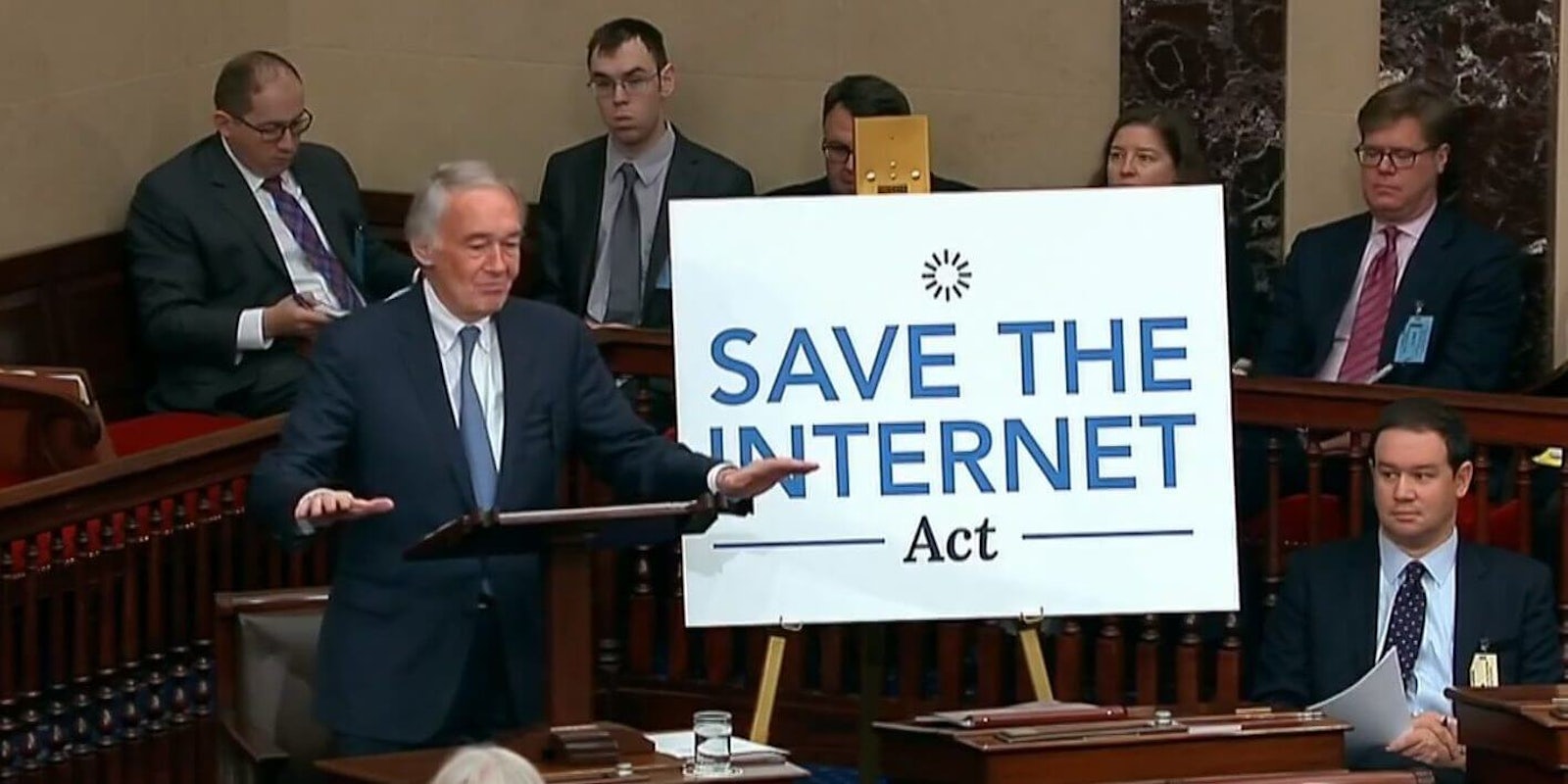Senate Democrats unsuccessfully demanded a full vote on net neutrality legislation today.
Sen. Edward Markey (D-Mass.) urged the Senate to take up the Save the Internet Act (SIA) that Majority Leader Sen. Mitch McConnell (R-Ky.) has refused to bring to the floor since it passed the House this spring. Markey was joined by Sens. Maria Cantwell (D-Wash.) and Ron Wyden (D-Ore.) by calling for a vote of unanimous consent to force the Senate to consider the legislation.
The Save the Internet Act would restore Obama-era regulations that prohibited companies from prioritizing or blocking traffic online, or allowing paid prioritization of websites. President Donald Trump’s Federal Communications Commission appointees repealed those regulations in 2017.
Markey and his colleagues argued that the Trump administration has given in to “Broadband Barons” who want to increase profits at the expense of consumers, small businesses and others. They believe that it’s only a matter of time before cable companies start slowing traffic to certain websites and speeding it up to others.
Researchers have already found that companies throttled traffic to Netflix, YouTube, and Amazon Prime Video. Firefighters from Santa Clara, California are among a group of government agencies suing Verizon for slowing web traffic during deadly wildfires there last year.
Based on these and other concerns, Markey said that passing SIA will put the Senate “on the right side of history.” They cast the legislation as necessary to promote innovation and entrepreneurialism and protect people’s ability to be heard.
“[Net neutrality] is just another way of saying non-discrimination … that large companies can’t discrimination against smaller companies and consumers, can’t stifle speech,” Markey said.
Sen. Wyden echoed this sentiment during his remarks, saying, “We’re talking about fracturing the internet into small bundles that cost big money. That’s the vision that the cable companies have.”
In spite of the fact that the overwhelming majority of Americans support net neutrality, Senate Republicans have “buried this bill in their legislation graveyard,” along with the Violence Against Women Act, gun control, and other bills that have already passed the House, Markey said.
“Net neutrality is part of that chorus of no’s which the Republicans aim at legislation which the American people want and need to have passed in the United States Senate,” he said.
As the name implies, requests for unanimous consent require only one objection to fail.
Sen. Roger Wicker (R-Miss.) was ready and willing to be just that objector.
During his objection, Wicker, a notorious opponent of the legislation, claimed that the 2015 regulations effectively smothered investment in broadband internet. Since Trump’s FCC repealed it, he continued, there has been historic expansion of internet access.
“If they want to save us from innovation and growth then perhaps the Save the Internet Act would get that done,” Wicker said. He said that Senate Democrats—of whom all but one, Sen. Kyrsten Sinema (D-Ariz.), have co-sponsored SIA—are welcome to join the bipartisan working group tasked with creating a proposal to preserve some semblance of net neutrality.
Wicker, Sinema and others believe the best way to preserve a free internet is under Title I, rather than Title II, as advocates for net neutrality argue.
“I hope they’ll join in the bipartisan effort that Senator Sinema and I are working on … we can make the statute better,” he said.
Advocates criticize the working group as an attempt to delay, weaken and obfuscate the push for net neutrality.
Wicker also expressed skepticism about companies beginning to prioritize internet traffic, though later he conceded that it was possible.
“Where are the fast and slow lanes? They may happen sometime,” he said. Nevertheless, he cast the vote as a choice between allowing the internet to grow by doing nothing or stifling it by passing SIA.
Democrats disagreed with this framing.
“What we just heard from the majority is in fact a false narrative that contends that we have to choose between broadband deployment and net neutrality … if we don’t put net neutrality back on the books, there will be internet fast and slow lanes. That’s what’s about to happen if we don’t act,” Markey said.
Markey seemed more disgusted than surprised that the proposal failed to receive unanimous consent.
“What just happened is a disservice to consumers and innovators…. Ultimately today history was not served well.”
READ MORE:


